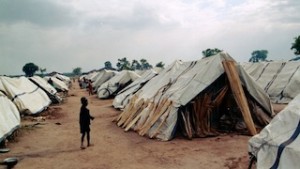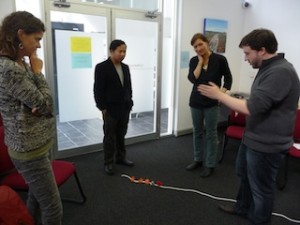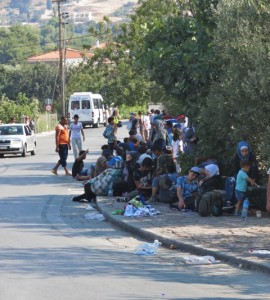Sorry, this entry is only available in de.
refugees
Es werden alle Berichte über Projekte angezeigt, die sich mit Flüchtlingen beschäftigen.All project reports on refugees are displayed.
Fearless – Support for young refugees
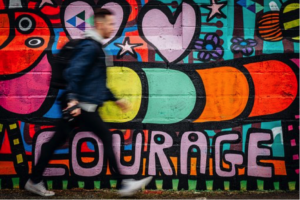
Since 2020, vivo international e.V., in cooperation with the University of Konstanz and the psychotherapy training institutes in Baden-Württemberg, has been addressing the mental health of young refugees who are seeking protection and asylum in Baden-Württemberg without parents or care. Lesen Sie weiter: Fearless – Support for young refugees

Since 2020, vivo international e.V., in cooperation with the University of Konstanz and the psychotherapy training institutes in Baden-Württemberg, has been addressing the mental health of young refugees who are seeking protection and asylum in Baden-Württemberg without parents or care. Continue reading: Fearless – Support for young refugees
The project continues!
The model project to improve psychotherapeutic care for refugees enters a new phase.
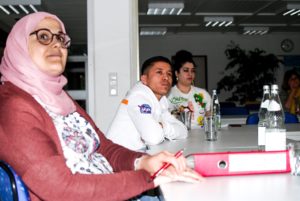
The model project to improve psychotherapeutic care for refugees enters a new phase.

Mental health of refugees in Germany
Kaltenbach, E., Hermenau, K., Schauer, M., Dohrmann, K., Elbert, T., Schalinski, I. (2020).
Trajectories of posttraumatic stress symptoms during and after Narrative Exposure Therapy (NET) in refugees.
BMC Psychiatry 20:312
Kaltenbach, E., Hermenau, K., Schauer, M., Elbert, T., Schalinski, I. (2018).
Course of Mental Health in Refugees—A One Year Panel Survey.
Front. Psychiatry 9:352
Kaltenbach, E., Hermenau, K., Schauer, M., Dohrmann, K., Elbert, T., Schalinski, I. (2020).
Trajectories of posttraumatic stress symptoms during and after Narrative Exposure Therapy (NET) in refugees.
BMC Psychiatry 20:312
Kaltenbach, E., Hermenau, K., Schauer, M., Elbert, T., Schalinski, I. (2018).
Course of Mental Health in Refugees—A One Year Panel Survey.
Front. Psychiatry 9:352
Improved care for burdened refugees
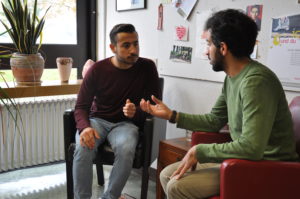
The pilot project for the support of psychologically burdened refugees, has been implemented throughout the district of Constance since the summer of 2017. The aim of the project to improve access to the health system for refugees has been successfully implemented. The project networks, qualifies and supports the existing resources in the district of Constance.

The pilot project for the support of psychologically burdened refugees, has been implemented throughout the district of Constance since the summer of 2017. The aim of the project to improve access to the health system for refugees has been successfully implemented. The project networks, qualifies and supports the existing resources in the district of Constance.
Project to support refugee pregnant women and mothers extended until 2021
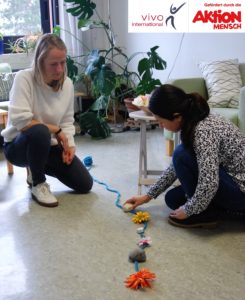
We are very happy about the further support of our project for traumatized pregnant women and mothers through Aktion Mensch.
In the last three years we have been able to reach more than 50 refugees with our therapeutic offers and train more than 600 full-time and volunteers in lectures and workshops on the subject of traumatisation.
Lesen Sie weiter: Project to support refugee pregnant women and mothers extended until 2021

We are very happy about the further support of our project for traumatized pregnant women and mothers through Aktion Mensch.
In the last three years we have been able to reach more than 50 refugees with our therapeutic offers and train more than 600 full-time and volunteers in lectures and workshops on the subject of traumatisation.
Continue reading: Project to support refugee pregnant women and mothers extended until 2021
Support for refugee pregnant women and young mothers
The time of pregnancy and birth is a vulnerable time for the healthy development of the child as well as the mental and physical health of mother and child. Women who have had to flee from war and crises have an enormous strength to take care of their families under the most difficult conditions. Two and a half years ago vivo international together with Aktion Mensch started a project to support traumatized refugee pregnant women and young mothers.
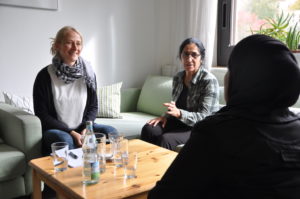
Lesen Sie weiter: Support for refugee pregnant women and young mothers
The time of pregnancy and birth is a vulnerable time for the healthy development of the child as well as the mental and physical health of mother and child. Women who have had to flee from war and crises have an enormous strength to take care of their families under the most difficult conditions. Two and a half years ago vivo international together with Aktion Mensch started a project to support traumatized refugee pregnant women and young mothers.

Continue reading: Support for refugee pregnant women and young mothers
vivo at the Humanitarian Congress Berlin 2018
This year, the 20th anniversary of the Humanitarian Congress Berlin took place. The Congress is held by Médecins Sans Frontières/ Doctors without Borders (MSF), Doctors of the World, the German Red Cross and the Berlin Chamber of Physicians and is a platform for international NGOs to discuss the major issues and challenges of humanitarian action. vivo international presented itself as an NGO with an information booth and two talks.
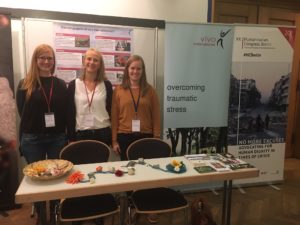
Lesen Sie weiter: vivo at the Humanitarian Congress Berlin 2018
This year, the 20th anniversary of the Humanitarian Congress Berlin took place. The Congress is held by Médecins Sans Frontières/ Doctors without Borders (MSF), Doctors of the World, the German Red Cross and the Berlin Chamber of Physicians and is a platform for international NGOs to discuss the major issues and challenges of humanitarian action. vivo international presented itself as an NGO with an information booth and two talks.

Continue reading: vivo at the Humanitarian Congress Berlin 2018
Support for refugees in Bielefeld
vivo supports the refugee outpatient clinic of the University Bielefeld
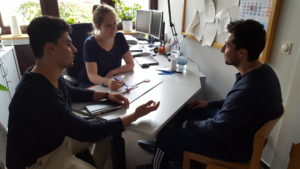
vivo and the research group for Clinical Psychology at the University of Bielefeld cooperate closely. Currently several projects are conducted with the aim to offer psychological support for affected refugees and asylum seekers.
vivo supports the refugee outpatient clinic of the University Bielefeld

vivo and the research group for Clinical Psychology at the University of Bielefeld cooperate closely. Currently several projects are conducted with the aim to offer psychological support for affected refugees and asylum seekers.
Therapy for traumatized refugees
German article on the dissemination of psychotherapy modules for traumatized refugees. Experience gained from trauma work in crisis and conflict regions.
Elbert, T., Wilker, S., Schauer, M., Neuner, F. (2016)
Dissemination psychotherapeutischer Module für traumatisierte Geflüchtete. Erkenntnisse aus der Traumaarbeit in Krisen- und Kriegsregionen.
Nervenarzt.
German article on the dissemination of psychotherapy modules for traumatized refugees. Experience gained from trauma work in crisis and conflict regions.
Elbert, T., Wilker, S., Schauer, M., Neuner, F. (2016)
Dissemination psychotherapeutischer Module für traumatisierte Geflüchtete. Erkenntnisse aus der Traumaarbeit in Krisen- und Kriegsregionen.
Nervenarzt.
Support for pregnant and traumatised refugee women
Currently, the district of Konstanz receives more traumatised refugee women. Many of these women are pregnant or young mothers and are severely burdened. The physical as well as the psychological condition of the pregnant women is of high importance for the future physical and psychological health of mothers and children. Furthermore, mothers who experienced stress and violence often show limited parental skills.
The project is supported by the organisation „Aktion Mensch“ and aims to diagnose and treat psychological problems of pregnant or mothering refugee women. First, the women participate in psycho-diagnostic interviews at the centre of competence psychotraumatology of the University of Kontanz and vivo international. Subsequently, they can receive individual psychological counselling, treatment and referral to the support network „Frühe Hilfen“ to prevent further stress and attachment problems.
Additionally, courses and lectures for social workers, volunteers, and professionals like doctors and midwives are held to share the developed treatment approaches.
Currently, the district of Konstanz receives more traumatised refugee women. Many of these women are pregnant or young mothers and are severely burdened. The physical as well as the psychological condition of the pregnant women is of high importance for the future physical and psychological health of mothers and children. Furthermore, mothers who experienced stress and violence often show limited parental skills.
The project is supported by the organisation „Aktion Mensch“ and aims to diagnose and treat psychological problems of pregnant or mothering refugee women. First, the women participate in psycho-diagnostic interviews at the centre of competence psychotraumatology of the University of Kontanz and vivo international. Subsequently, they can receive individual psychological counselling, treatment and referral to the support network „Frühe Hilfen“ to prevent further stress and attachment problems.
Additionally, courses and lectures for social workers, volunteers, and professionals like doctors and midwives are held to share the developed treatment approaches.
The Nairobi Position Statement on Refugee and IDP Mental Health Care
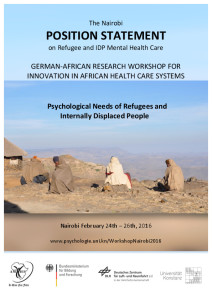
This statement is the product of a first workshop initiated by the German Federal Ministry of Education and Research that brought together a group of established and young researchers, clinicians and NGOs discussing ways to integrate the mental health care of displaced people into African national mental health care systems. In this paper, the group called for a better cooperation between national mental health care systems and international organizations supporting the mental health of displaced people. They criticized the situation that in many countries parallel mental health care systems are established and that both systems suffered from lack of resources. The group recommended that national mental health systems should be build up and further developed in the context of serving displaced peoples’ mental health needs. They identified several obstacles, e.g. the unwillingness of governments to prioritize mental health care and the challenge for NGOs to cooperate with government structures.
For the Nairobi Position Statement on Refugee and IDP Mental Health Care please follow this link.

This statement is the product of a first workshop initiated by the German Federal Ministry of Education and Research that brought together a group of established and young researchers, clinicians and NGOs discussing ways to integrate the mental health care of displaced people into African national mental health care systems. In this paper, the group called for a better cooperation between national mental health care systems and international organizations supporting the mental health of displaced people. They criticized the situation that in many countries parallel mental health care systems are established and that both systems suffered from lack of resources. The group recommended that national mental health systems should be build up and further developed in the context of serving displaced peoples’ mental health needs. They identified several obstacles, e.g. the unwillingness of governments to prioritize mental health care and the challenge for NGOs to cooperate with government structures.
For the Nairobi Position Statement on Refugee and IDP Mental Health Care please follow this link.
Presenting vivo’s work at the annual meeting of the DeGPT
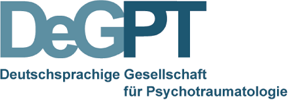
Several vivo-members presented vivo’s work on the 18. annual meeting of the german speaking society for psychotraumatology (DeGPT) from 10. to 12. March 2016.
Dr. Maggie Schauer promotes in her lecture “Mental health first!” a paradigm shift in the care systems for refugees in Germany. Dr. Thomas Elbert presented the trauma-work with street children, gangs, former child soldiers and unaccompanied minor refugees. Dr. Tobias Hecker talked in two symposia about trauma and memory as well as trauma and violence.

Several vivo-members presented vivo’s work on the 18. annual meeting of the german speaking society for psychotraumatology (DeGPT) from 10. to 12. March 2016.
Dr. Maggie Schauer promotes in her lecture “Mental health first!” a paradigm shift in the care systems for refugees in Germany. Dr. Thomas Elbert presented the trauma-work with street children, gangs, former child soldiers and unaccompanied minor refugees. Dr. Tobias Hecker talked in two symposia about trauma and memory as well as trauma and violence.
German-African research workshop
for innovation in African health care systems
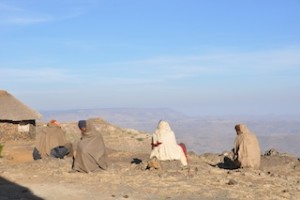
In February, the first German-African research workshop for innovation in African health care systems took place in Nairobi.
The workshop received high interest. In total, 54 participants and representatives from seven national and six international societies came together including African and German clinicians, scientists, representatives from universities and NGOs, well established researchers and talented young academics who could be supported with travel grants.
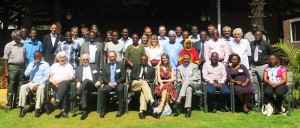
In 27 presentations and three round table discussions epidemiological aspects of mental health care for refugees as well as current challenges in health care systems were discussed in order to find new methods for innovation in health care and treatment.
The participants compiled the Nairobi Position Statement on Refugee and IDP Mental Health Care, which provides recommendations for further steps for improving mental health care in African countries.
for innovation in African health care systems

In February, the first German-African research workshop for innovation in African health care systems took place in Nairobi.
The workshop received high interest. In total, 54 participants and representatives from seven national and six international societies came together including African and German clinicians, scientists, representatives from universities and NGOs, well established researchers and talented young academics who could be supported with travel grants.

In 27 presentations and three round table discussions epidemiological aspects of mental health care for refugees as well as current challenges in health care systems were discussed in order to find new methods for innovation in health care and treatment.
The participants compiled the Nairobi Position Statement on Refugee and IDP Mental Health Care, which provides recommendations for further steps for improving mental health care in African countries.
The Mass Refugee Movement – Better Reframed as Mental Health Crisis?
Dr Maggie Schauer’s thoughts on the current refugee movement, the causes of migration and flight as well as its consequences on mental health published in the ISTSS stress points, a quarterly news letter for ISTSS members. To read the article, please follow this link.
Dr Maggie Schauer’s thoughts on the current refugee movement, the causes of migration and flight as well as its consequences on mental health published in the ISTSS stress points, a quarterly news letter for ISTSS members. To read the article, please follow this link.
Expressing the inexpressible
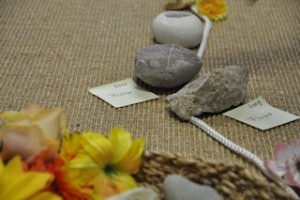
According to Amnesty International, torture is still practised in over 140 countries – with purported aims ranging from the extortion of confessions to attempts at demonstrating the alleged successes of criminal and political investigations. Despite these claims, however, the actual goal of the torturers is often the destruction of the victim’s personality and identity.

According to Amnesty International, torture is still practised in over 140 countries – with purported aims ranging from the extortion of confessions to attempts at demonstrating the alleged successes of criminal and political investigations. Despite these claims, however, the actual goal of the torturers is often the destruction of the victim’s personality and identity.
Building trauma expertise for Cyprus
A sorely afflicted island takes care of refugees.
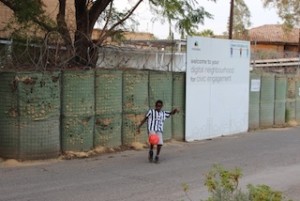
vivo-members offered the first NET-training for Cyprus and the eastern Mediterranean region and layed the foundation for future collaborative projects.
Lesen Sie weiter: Building trauma expertise for Cyprus
A sorely afflicted island takes care of refugees.

vivo-members offered the first NET-training for Cyprus and the eastern Mediterranean region and layed the foundation for future collaborative projects.
Continue reading: Building trauma expertise for Cyprus
NET down under
In 2015 Narrative Exposure Therapy has once again reached Australia.
In 2015 Narrative Exposure Therapy has once again reached Australia.
Aid for refugees at Lesbos
Two vivo members from Norway, Merethe Hellen and Hakon Stenmark, took part in a mission to the greek island Lesbos to investigate the conditions of refugees arriving at the island. Whilst larger aid agencies provided help in the refugee camps in the largest city, Mytilini, there was no support for the arriving refugees on the rest of the island.
Two vivo members from Norway, Merethe Hellen and Hakon Stenmark, took part in a mission to the greek island Lesbos to investigate the conditions of refugees arriving at the island. Whilst larger aid agencies provided help in the refugee camps in the largest city, Mytilini, there was no support for the arriving refugees on the rest of the island.
Research on traumatic stress and asylum seekers
Neuner, F., Kurreck, S., Ruf, M., Odenwald, M., Elbert, T., Schauer, M.(2010).
Can asylum-seekers with posttraumatic stress disorder be successfully treated? A randomized controlled pilot study.
Cogn Behav Ther, 39(2), 81-91.
Ruf, M., Schauer, M., Neuner, F., Catani, C., Schauer, E., Elbert, T.(2010).
Narrative exposure therapy for 7- to 16-year-olds: A randomized controlled trial with traumatized refugee children.
Journal of Traumatic Stress.
Neuner, F., Kurreck, S., Ruf, M., Odenwald, M., Elbert, T., Schauer, M.(2010).
Can asylum-seekers with posttraumatic stress disorder be successfully treated? A randomized controlled pilot study.
Cogn Behav Ther, 39(2), 81-91.
Ruf, M., Schauer, M., Neuner, F., Catani, C., Schauer, E., Elbert, T.(2010).
Narrative exposure therapy for 7- to 16-year-olds: A randomized controlled trial with traumatized refugee children.
Journal of Traumatic Stress.
Refugees in Kenya
Kenya is among the countries that host a very high number of refugees in relation to its population. With Kakuma and Dadab it operates two of the largest refugee camps in the world, where hundreds of thousands of refugees from Sudan, Somalia and other war-torn countries live for decades in a semi-arid region. More than half a million Somali refugees live in the country. The project in which vivo is cooperating tries to develop and evaluate adapted psychiatric treatment strategies that address PTSD, substance abuse and severe psychotic disorders.
Kenya is among the countries that host a very high number of refugees in relation to its population. With Kakuma and Dadab it operates two of the largest refugee camps in the world, where hundreds of thousands of refugees from Sudan, Somalia and other war-torn countries live for decades in a semi-arid region. More than half a million Somali refugees live in the country. The project in which vivo is cooperating tries to develop and evaluate adapted psychiatric treatment strategies that address PTSD, substance abuse and severe psychotic disorders.
vivo in Somalia
Since 1991 the country has no functioning governemt and is considered as failed state. Throughout the past 13 years, vivo has cooperated with local and international organizations to implement projects in Somaliland, the North-Western part of Somalia.
Since 1991 the country has no functioning governemt and is considered as failed state. Throughout the past 13 years, vivo has cooperated with local and international organizations to implement projects in Somaliland, the North-Western part of Somalia.
vivo’s initial steps in Uganda
Uganda has a long history of civil wars and has been surrounded by some of the worst conflicts in African history. As a consequence, Uganda hosts large refugee populations from many foreign countries and has to deal with the legacy of their own wars. vivo’s work in Uganda started in 1999 with the first trial of Narrative Exposure Therapy (NET) treating traumatized Sudanese refugees in Imvepi refugee camp situated in the very North of Uganda.
Uganda has a long history of civil wars and has been surrounded by some of the worst conflicts in African history. As a consequence, Uganda hosts large refugee populations from many foreign countries and has to deal with the legacy of their own wars. vivo’s work in Uganda started in 1999 with the first trial of Narrative Exposure Therapy (NET) treating traumatized Sudanese refugees in Imvepi refugee camp situated in the very North of Uganda.


